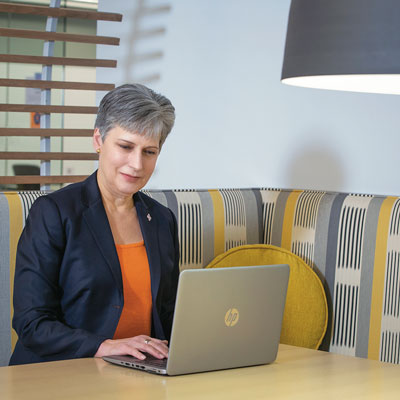HCA Healthcare Chief Nurse Executive Jane Englebright explains how we can meet their needs
In 2020, dubbed “The Year of the Nurse and Midwife” by nursing associations, nurses were considered the most trusted and ethical professionals in the U.S. for the 19th straight year, according to a Gallup poll. With a record-breaking 89% of respondents ranking their trust in nurses as high or very high, it’s no surprise nurses’ crucial role garnered even more attention and respect last year, given the invaluable part they have played during the COVID-19 pandemic.
“Nursing is the lifeblood of our enterprise,” says Jane Englebright, Ph.D., RN, CENP, FAAN, Senior Vice President and Chief Nurse Executive for Nashville, Tennessee-based HCA Healthcare. She sees firsthand every day how nurses are keeping the system running. “Nurses are innovating with technology to solve emerging issues, analyzing research and evidence-based practices to create best-in-class standards of care and taking care of each other in situations we could not have imagined.”
Englebright explains it’s as important as ever to provide nurses with what they need to forge ahead through the pandemic and beyond.
Making tools & information available
The pandemic has put all healthcare workers—especially front-line nurses—under an immense amount of stress. “As leaders, we have to recognize the trauma our caregivers are enduring,” Englebright says.
Part of that stress management is ensuring nurses have the tools necessary to do their job, and Englebright says that starts with taking the time to listen. “Understanding their thoughts and taking action on their suggestions is critical to supporting them in the short term and also in building a strong strategy to meet their needs in the long term.”
When in doubt, Englebright recommends starting with the basics. “In our zeal to help, leaders sometimes act without asking nurses what they need—we often think too big,” she says. In some cases, she explains, the solutions are simple, such as procuring more thermometers, repairing a computer or rescheduling a linen delivery. “These are little things, but solving these small-but-frequent frustrations can have a big impact.”
Problem-solving also requires the sharing of information, both ways. “As part of this effort, HCA Healthcare has created intentional and purposeful ways of connecting with nurses,” Englebright notes. These efforts have included frequent surveys to gauge nurse engagement and needs, advisory councils, shared governance models and new approaches to quickly deliver COVID-19 education to front-line nurses through their mobile devices.
Offering essential resources
In addition to having the proper tools to do their jobs, nurses must feel safe, connected and supported. (See “Stress Test: COVID’s Affect on Healthcare Workers” for more on managing mental health care for clinicians.) “A year into the pandemic, our teams are fatigued,” says Englebright. “Supporting them means making sure they have access to emotional support and stress management resources, and they feel safe in the work environment.”
While HCA Healthcare prioritized creating robust wellness programs before the pandemic, Englebright explains that COVID-19 accelerated the rollout of additional resources to support its teams:
- Nurse Care: This anonymous help line provides free, professional emotional support for nurses. They can call about anything from pandemic-related stress and work-life balance to marital issues. In 2020, Nurse Care received more than 25,000 calls across the healthcare network, 20,000 of which were related to COVID-19.
- HCA Inspire: This mobile app supports nurses in several ways. Not only does it offer up-to-date communication on what’s happening both within a facility and inside the organization as a whole, but it also includes career mapping features and encourages new nurses, or nurses looking to transition to another specialty, to find a mentor within HCA Healthcare.
- iMobile: This on-demand mobile technology connects care teams within facilities. Compassionate, connected care is always vital in nursing, and the pandemic required HCA Healthcare to find new ways to increase virtual connections across the enterprise, including virtual preceptors for new and redeployed nurses to provide guidance and mentoring.
- The Hope Fund: Colleagues support and run this public charity. It helps staff members navigate unexpected crises, such as a personal illness, death of a family member or financial challenges related to the COVID-19 pandemic. Since the Hope Fund’s inception in 2005, HCA Healthcare colleagues have helped to deliver more than $67 million in assistance to more than 40,000 families when they needed it most. More than $3 million of this total was distributed to over 2,000 colleagues to help with the loss of household income, childcare costs or other unexpected financial challenges related to the COVID-19 pandemic.
Providing opportunity for growth
While the challenges nurses face today are daunting, Englebright believes this is a great time to become a nurse. “You can immediately have a tremendous impact,” she says. “By serving in such a trusted role, nurses are pivotal on a daily basis to public health outcomes—not just during a health crisis.”
The unique combination of trustworthiness and expertise means the nursing profession is rife with opportunity. “The amazing variety of the nursing profession creates the ability to have several different careers,” Englebright explains. “For example, I think the RN in acute care is going to become more engaged in care coordination, overseeing the work of assistive personnel, and monitoring patient needs and conditions using technical tools and evaluating alerts from artificial intelligence.”
HCA Healthcare offers a wide variety of roles in alternate sites of care, from the bedside to roles in transfer nursing, call centers and surgery centers. “We aim to give nurses options and flexibility to work in a role that fits their lifestyle,” Englebright adds.
In the near term, the COVID-19 pandemic is also providing unique opportunities for improvements.
“I hope that nurses can leverage some of the trust and goodwill to continue encouraging communities to take precautions to prevent the spread of COVID-19,” Englebright notes. “I believe we will look back on the events of the past year and realize we have set new standards for exceptional care in this country.”
 Jane Englebright, Ph.D., RN, CENP, FAAN, serves as Senior Vice President and Chief Nurse Executive for HCA Healthcare, one of the nation’s leading providers of healthcare services based in Nashville, Tennessee. Englebright oversees 98,000 nurses across the enterprise.
Jane Englebright, Ph.D., RN, CENP, FAAN, serves as Senior Vice President and Chief Nurse Executive for HCA Healthcare, one of the nation’s leading providers of healthcare services based in Nashville, Tennessee. Englebright oversees 98,000 nurses across the enterprise.
Englebright began working at HCA Healthcare as a critical care nurse in 1992. In 1996, she was appointed Chief Nursing Officer at an HCA Healthcare hospital in San Antonio, Texas. In 2007, she became the health system’s first enterprise Chief Nurse Executive.
On Jan. 1, 2021, The Joint Commission named Englebright the Board of Commissioners Chair, a role she takes to heart. “Like many other elements of our healthcare system, The Joint Commission has been disrupted by COVID-19,” Englebright says. “My goal is to support the organization and its leadership team as they continue to navigate the pandemic.”






